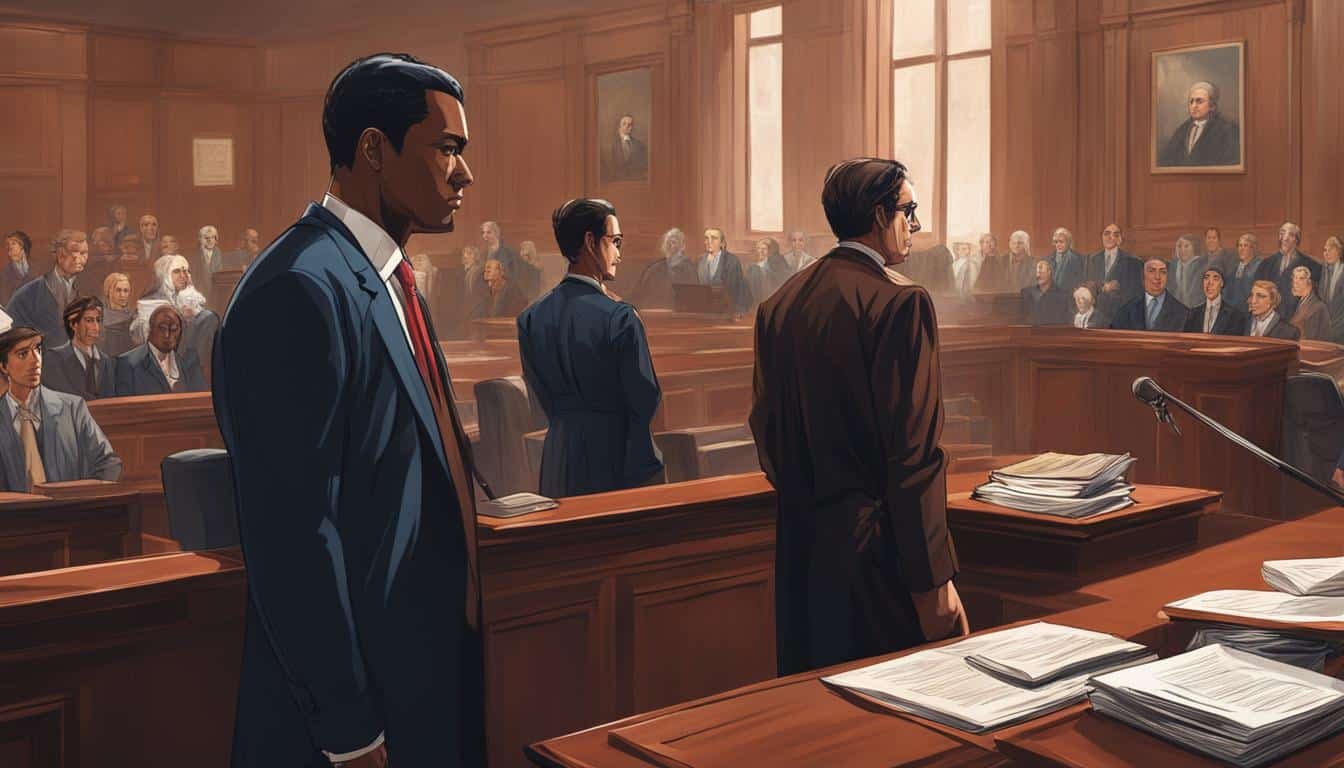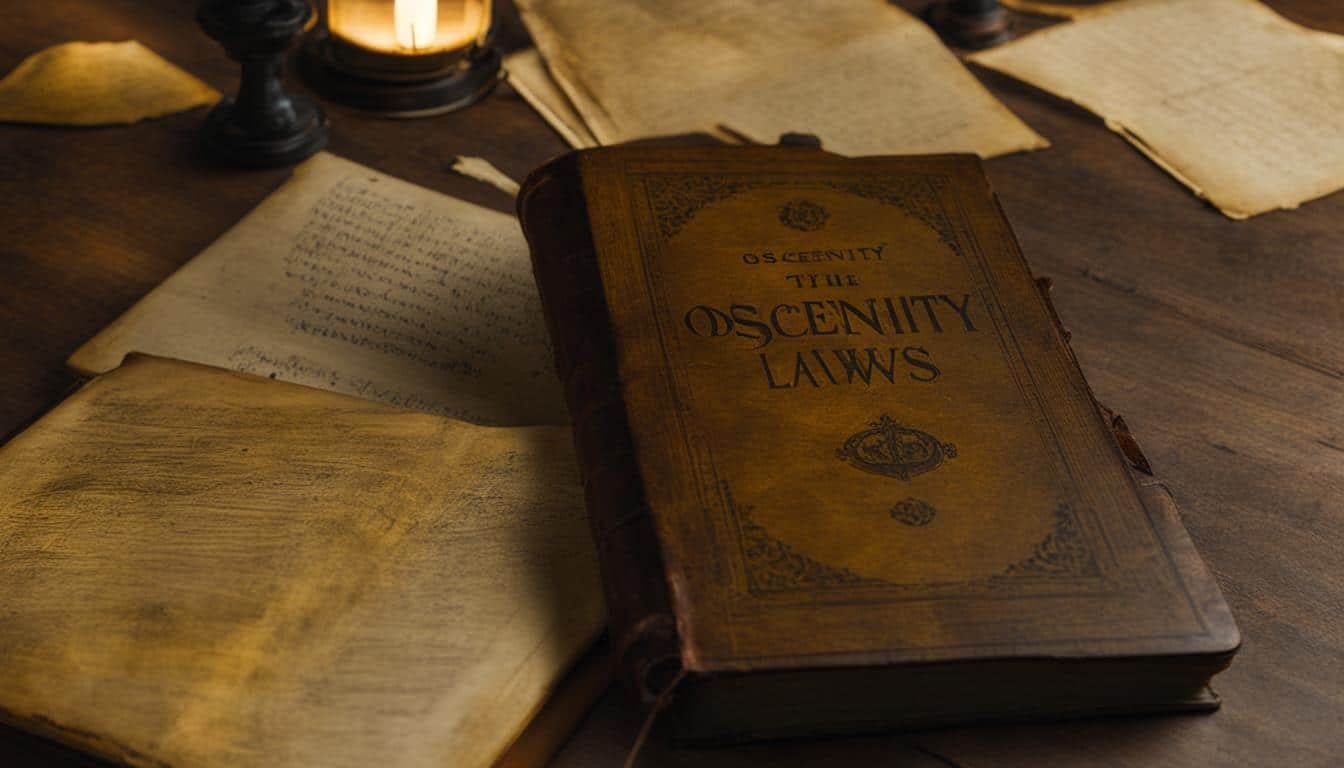Welcome to our article on mastering defense tactics in obscenity case defense. In this comprehensive guide, we will provide you with valuable insights and recommendations for navigating the complexities of obscenity cases with confidence and success. Whether you are an attorney, a defendant representing yourself, or simply interested in learning more about legal strategies and defense tactics, this article is here to help you.
Key Takeaways:
- Understanding defense tactics is crucial in obscenity case defense.
- Legal strategies can greatly impact the outcome of an obscenity case.
- Effective defense tactics require careful consideration and preparation.
- Navigating the complexities of obscenity cases requires knowledge and expertise.
- By implementing the strategies discussed, you can build a strong defense in obscenity cases.
Understanding the Mindset of Judges in Obscenity Cases
In obscenity cases, understanding the mindset of judges is paramount to mounting an effective defense. Judges have their own perspectives and preferences, and being aware of these can make a significant impact on the outcome of your case. To impress judges and avoid courtroom annoyances, it’s crucial to act lawyerly and leave a positive impression on the bench.
Impressing Judges: A Judge’s Perspective
One judge’s perspective reveals various things that lawyers do that can annoy or impress judges. By avoiding common annoyances and adopting behaviors that impress judges, you can strengthen your defense and increase your chances of success.
“I find it very annoying when lawyers are unprepared and fail to present their arguments concisely. It’s important to come to court with a clear strategy and be well-versed in the relevant laws and precedents. Additionally, being respectful and professional in both speech and conduct can go a long way in leaving a positive impression on the judge.”
By understanding the judge’s perspective, you can tailor your approach to align with their expectations. This may involve being mindful of your presentation style, ensuring your arguments are well-structured and supported by evidence, and demonstrating a thorough knowledge of the case and legal principles.
| Annoyances | Impressions |
|---|---|
| Unpreparedness | Prepared and organized |
| Ineffective communication | Clear and concise arguments |
| Disrespectful behavior | Professional and respectful conduct |
| Ignoring courtroom decorum | Adhering to courtroom etiquette |
By avoiding annoyances and making a favorable impression on judges, you can enhance your credibility and increase the likelihood of a favorable outcome in obscenity cases.
The Right to Self-Representation and its Impact in Obscenity Cases
When facing an obscenity case, you have the constitutional right to self-representation. The Sixth Amendment guarantees your right to choose whether to defend yourself without the assistance of counsel. This means that you have the option to take control of your own defense and present your case directly to the court.
The landmark case of Faretta v. California established this right to self-representation. In Faretta’s case, the Supreme Court held that a defendant has the autonomy to choose whether to proceed pro se, as long as they make a knowing, voluntary, and intelligent waiver of the right to counsel. The decision emphasized the importance of preserving an individual’s right to make decisions about their defense and recognized the potential benefits of self-representation.
While self-representation can be a challenging endeavor, it also provides unique opportunities. By representing yourself, you have direct control over your defense strategy, the presentation of evidence, and the examination of witnesses. This level of involvement allows you to present your case in a manner that aligns with your understanding of the facts and your personal perspective.
The Benefits and Considerations of Self-Representation in Obscenity Cases
Self-representation can offer certain advantages in obscenity cases. It allows you to save on legal fees and have a more active role in your defense. You have the opportunity to immerse yourself in the details of your case, gaining a deeper understanding of the law and the intricacies of your charges.
However, self-representation also comes with significant responsibilities. It requires thorough preparation, an understanding of legal procedures, and effective courtroom etiquette. It is essential to carefully weigh the pros and cons of self-representation and consider the complexity of your case before deciding whether to exercise your right to represent yourself.
| Pros of Self-Representation | Cons of Self-Representation |
|---|---|
|
|
“By representing yourself, you have direct control over your defense strategy, the presentation of evidence, and the examination of witnesses.”
Should you choose to represent yourself in an obscenity case, it is crucial to familiarize yourself with the relevant laws, court rules, and procedures specific to your jurisdiction. Consider seeking guidance from legal resources, consulting with legal professionals for advice, and diligently preparing your defense to ensure the best possible outcome.
Common Evidentiary Objections in Obscenity Cases
In obscenity cases, it is crucial to be well-versed in handling evidentiary objections that may arise in court. By understanding common objections and knowing how to effectively respond to them, you can strengthen your defense and ensure that only admissible evidence is presented before the jury.
Here are five types of evidentiary objections that are frequently encountered in obscenity cases:
- Argumentative objections: These objections are raised when an attorney attempts to make an argument instead of asking a question. To handle this objection, rephrase your question to elicit a straightforward response from the witness without drawing any conclusions.
- Speculation objections: When a witness offers testimony based on speculation rather than factual knowledge, speculation objections may be raised. Overcome these objections by asking the witness to provide facts or evidence supporting their statement, or rephrase your question to elicit grounded testimony.
- Objections that assume facts not in evidence: These objections occur when a question assumes the existence of a fact that has not been established or presented as evidence. To overcome this objection, ensure that you have laid the necessary foundation and established the facts before asking the question.
- Foundation objections: Foundation objections are raised when a question is asked without first establishing the witness’s qualification or familiarity with the subject matter. To overcome this objection, lay a solid foundation by asking preliminary questions that establish the witness’s expertise.
- Objections to leading questions: Leading questions are those that suggest the desired answer or put words in the witness’s mouth. Objections to leading questions can be overcome by rephrasing the question to be more open-ended or by seeking permission from the court to ask leading questions if allowed.
By being prepared for these common evidentiary objections and knowing how to handle them effectively, you can navigate the challenges of presenting your case in an obscenity trial with confidence and ensure that your defense is not hindered by objections raised by opposing counsel.
| Evidentiary Objection | Description | Response |
|---|---|---|
| Argumentative Objection | When an attorney makes an argument instead of asking a question. | Rephrase the question to elicit a straightforward response without drawing conclusions. |
| Speculation Objection | When a witness offers testimony based on speculation rather than factual knowledge. | Ask the witness to provide facts or evidence supporting their statement, or rephrase the question to elicit grounded testimony. |
| Assumes Facts Not in Evidence Objection | When a question assumes the existence of a fact that has not been established or presented as evidence. | Ensure that the necessary foundation has been laid and the facts established before asking the question. |
| Foundation Objection | When a question is asked without first establishing the witness’s qualification or familiarity with the subject matter. | Lay a solid foundation by asking preliminary questions that establish the witness’s expertise. |
| Objection to Leading Question | When a question suggests the desired answer or puts words in the witness’s mouth. | Rephrase the question to be more open-ended or seek permission from the court to ask leading questions if allowed. |
Mastering Argumentative Objections in Obscenity Cases
In obscenity cases, argumentative objections can pose challenges to the defense. It is important to understand the legal basis for these objections and how to respond effectively. By avoiding improper evidence and focusing on drawing factual conclusions, you can strengthen your defense strategy. Here are some key points to consider:
Identifying Argumentative Objections
Argumentative objections are raised when an attorney draws conclusions or makes arguments instead of presenting evidence. These objections aim to prevent the introduction of improper evidence that may improperly persuade the jury. To identify argumentative objections, listen closely to opposing counsel’s line of questioning and objections raised during the trial.
Responding to Argumentative Objections
When faced with argumentative objections, it is crucial to provide the court with factual evidence rather than drawing conclusions or making arguments. State the facts clearly and objectively, and avoid introducing personal opinions or assumptions. Refrain from speculating or making inferences that are not supported by the evidence presented.
Remember, the goal is to present the jury with reliable and factual evidence that supports your defense strategy. By avoiding argumentative objections and focusing on proper evidence, you can strengthen your case.
By mastering argumentative objections in obscenity cases, you can ensure that only factual evidence is presented and that conclusions are left for closing arguments. By staying focused on presenting reliable evidence and avoiding improper arguments, you can build a strong defense strategy and protect your rights.
| Key Points to Remember | Benefits |
|---|---|
| Avoid drawing conclusions or making arguments | Present reliable and factual evidence |
| Identify argumentative objections raised by opposing counsel | Strengthen your defense strategy |
| Respond objectively with clear and factual statements | Ensure the presentation of proper evidence |
Handling Speculation Objections in Obscenity Cases
Speculation objections can be a challenging hurdle to navigate in obscenity cases. These objections arise when witnesses offer testimony based on unreliable speculation rather than grounded facts. It is crucial to overcome speculation objections and elicit admissible evidence that is reliable and well-founded. By understanding how to handle these objections effectively, you can strengthen your defense strategy and present a compelling case before the jury.
When faced with a speculation objection, rephrasing the question can be a useful tactic. By reframing the question to focus on the witness’s firsthand knowledge, you can avoid eliciting speculative testimony. For example, instead of asking, “What do you think the defendant’s intention was?”, try asking, “Based on your observations, what did you witness the defendant doing?” This approach shifts the focus from opinions and guesses to objective observations.
It is crucial to overcome speculation objections and elicit admissible evidence that is reliable and well-founded.
In addition to rephrasing questions, it is essential to establish the witness’s credibility and qualifications. By probing into their expertise and experience, you can lay the groundwork for presenting reliable testimony. For instance, you can ask the witness about their background, training, or previous involvement in similar cases. This establishes their credibility and reinforces the validity of their testimony, making it harder for opposing counsel to raise speculation objections.
By diligently addressing speculation objections and ensuring the presentation of grounded evidence, you can build a strong defense in obscenity cases. Remember to focus on reliable facts and firsthand knowledge, avoiding speculative statements. By doing so, you can strengthen your case and increase the chances of a favorable outcome.
| Common Speculation Objections | How to Overcome Them |
|---|---|
| The witness offers an opinion without a factual basis | Rephrase the question to focus on objective observations and firsthand knowledge |
| The witness relies on assumptions rather than verifiable facts | Ask the witness to provide evidence or direct observations rather than assumptions |
| The witness’s testimony is based on unreliable sources | Probe into the credibility of the sources and establish the witness’s firsthand knowledge |
| The witness attempts to provide speculative predictions or guesses | Reframe the question to focus on the witness’s observations and avoid seeking predictions |
Avoiding Assumptions with Assumes Facts Not in Evidence Objections
One common objection that can arise during obscenity cases is the “assumes facts not in evidence” objection. This objection is raised when a question assumes the existence of a fact that has not been established or presented as evidence. It is important for defense attorneys to be aware of this objection and know how to overcome it in order to present a strong defense.
When faced with an “assumes facts not in evidence” objection, the first step is to carefully review the question that was objected to. Look for any statements or assumptions that are not supported by the evidence that has been presented in the case. Consider whether the question is asking the witness to speculate or make assumptions about facts that have not been established.
To overcome this objection, it is necessary to establish the missing facts through proper questioning and presentation of evidence. This may involve calling additional witnesses or introducing documents or other physical evidence that can support the missing facts. By laying the necessary foundation and presenting the evidence, defense attorneys can successfully overcome the “assumes facts not in evidence” objection and ensure that only relevant and admissible evidence is presented to the court.
Example:
Defense Attorney: Mr. Smith, did you see the defendant enter the store on the day of the alleged incident?
Prosecutor: Objection, assumes facts not in evidence. There is no evidence that the defendant was even present at the store.
Judge: Sustained.
In this example, the question assumes that the defendant was present at the store, but there is no evidence to support this assumption. To overcome the objection, the defense attorney could introduce surveillance footage or call a witness who can testify to seeing the defendant at the store. By establishing the missing fact through proper evidence, the defense can overcome the objection and present a compelling defense in the obscenity case.
It is crucial for defense attorneys to be prepared for the “assumes facts not in evidence” objection and have strategies in place to address it effectively. By understanding the objection, carefully reviewing questions, and presenting the necessary evidence, defense attorneys can navigate this challenge and build a solid defense in obscenity cases.
Establishing Solid Foundations to Overcome Objections in Obscenity Cases
When defending against obscenity charges, it is crucial to establish solid foundations to overcome objections that may arise during the trial. Foundation objections occur when a question is asked without first establishing the witness’s qualifications or familiarity with the subject matter. By properly qualifying witnesses and establishing credibility, you can strengthen your defense and present a persuasive case to the court.
To lay a solid foundation, it is essential to thoroughly vet each witness and ensure they have the necessary expertise and knowledge related to the case. This can be done through careful questioning and probing their qualifications. For example, if you are presenting an expert witness in the field of adult content, you should establish their experience, education, and involvement in relevant research or professional activities. By establishing their expertise, you can preemptively address any objections regarding the witness’s qualification.
In addition to qualifying witnesses, it is crucial to establish their credibility in the eyes of the court. This can be achieved by delving into their previous experience in similar cases, presenting evidence of their impartiality, or highlighting their reputation within their respective field. By establishing credibility, you not only counter potential objections but also enhance the persuasiveness of the witness’s testimony, thereby strengthening your entire defense strategy.
Example of Establishing a Witness’s Qualification and Credibility:
Attorney: Ms. Smith, could you please state your name and occupation for the court?
Witness: Yes, my name is Jane Smith, and I am a licensed psychologist specializing in human sexuality.
Attorney: Thank you, Ms. Smith. Can you briefly outline your educational background and experience in the field of psychology?
Witness: Certainly. I obtained my Ph.D. in Psychology from XYZ University and have been practicing for over a decade. Throughout my career, I have conducted extensive research on human sexual behavior and have authored several peer-reviewed publications on the subject.
Attorney: Your Honor, I would like to establish Ms. Smith’s qualifications as an expert witness in the area of human sexuality based on her education, experience, and contributions to the field.
| Witness Qualification | Establishing Credibility |
|---|---|
| Education: Ph.D. in Psychology | Extensive experience in the field |
| Years of Experience: Over a decade | Author of peer-reviewed publications |
| Research Focus: Human sexual behavior | Recognized as an expert in court cases |
By employing these strategies, you can effectively lay the groundwork for a successful defense in obscenity cases. Remember to thoroughly qualify your witnesses, establish their credibility, and anticipate potential objections to strengthen your overall defense strategy and increase the chances of a favorable outcome.
Effective Strategies for Addressing Objections in Obscenity Cases
When it comes to addressing objections in obscenity cases, it is crucial to have a well-prepared and strategic approach. By refocusing questioning, redirecting the line of inquiry, and presenting the desired evidence, you can effectively overcome objections and ensure that your defense remains strong. Here are some effective strategies to consider:
Refocusing Questioning
One way to address objections is by refocusing your questioning. If an objection is sustained, rather than persisting with the same line of inquiry, you can rephrase your question in a way that avoids the objectionable issue. By reframing your question, you can continue gathering relevant information without running into further objections. This strategy allows you to maintain the flow of your defense and keep the jury engaged.
Redirecting the Line of Inquiry
If an objection is sustained and you find yourself unable to proceed with your original questioning, it’s important to be flexible and redirect the line of inquiry. By quickly adapting your approach and shifting the focus to a different aspect of the case, you can continue presenting evidence and building your defense. This strategy ensures that objections do not derail your line of questioning and allows you to present a comprehensive and compelling argument.
Presenting Evidence
When objections are raised, it is essential to have a clear plan for presenting your desired evidence. By organizing your evidence in a logical and coherent manner, you can effectively address objections and ensure that important information is presented to the court. Whether through witness testimony, exhibits, or expert opinions, presenting compelling evidence strengthens your defense and bolsters your argument. Make sure to anticipate potential objections and have a strong foundation for the admissibility of your evidence.
By employing these effective strategies for addressing objections in obscenity cases, you can navigate the trial process with confidence and maintain a strong defense. Remember to stay calm and composed when objections arise, and always be prepared to adapt your approach to ensure the smooth progression of your defense.
| Strategy | Explanation |
|---|---|
| Refocusing Questioning | Rephrase questions to avoid objectionable issues |
| Redirecting the Line of Inquiry | Shift the focus to a different aspect of the case |
| Presenting Evidence | Organize evidence effectively to address objections and strengthen the defense |
Navigating the Challenges of Self-Representation in Obscenity Cases
Representing yourself in obscenity cases presents a unique set of challenges that require careful navigation. Balancing legal knowledge and courtroom etiquette is essential to ensure a successful defense. By understanding and addressing these challenges head-on, you can effectively advocate for yourself and protect your rights in court.
One of the primary challenges of self-representation is the lack of legal expertise compared to trained attorneys. It is crucial to educate yourself about obscenity laws, courtroom procedures, and the rules of evidence. This will enable you to present a strong defense and effectively counter the prosecution’s arguments.
Additionally, courtroom etiquette plays a vital role in how you are perceived by the judge and jury. Maintaining a respectful and professional demeanor is crucial to earning their respect and credibility. Dress appropriately, speak clearly and confidently, and always address the court with respect. These small gestures can make a significant impact on how your case is perceived.
Table: Tips for Navigating Self-Representation Challenges in Obscenity Cases
| Challenges | Tips for Overcoming |
|---|---|
| Lack of legal expertise | Thoroughly research obscenity laws and courtroom procedures. Consult legal resources for guidance. |
| Courtroom etiquette | Respectfully address the court, dress professionally, and maintain a calm and confident demeanor. |
| Organizing case materials | Create a detailed case strategy, gather relevant evidence, and keep all documents organized and easily accessible. |
| Presenting a compelling argument | Prepare persuasive opening and closing statements. Present evidence clearly and concisely, focusing on key points. |
Furthermore, organizing your case materials is crucial to effectively presenting your defense. Develop a detailed case strategy, gather all relevant evidence, and keep your documents organized. This will allow you to present your arguments coherently and strengthen your position in court.
Lastly, presenting a compelling argument is essential to persuading the judge and jury of your innocence. Craft persuasive opening and closing statements that clearly outline your defense. Present your evidence in a concise and focused manner, emphasizing key points that support your case.
By acknowledging and addressing the challenges of self-representation in obscenity cases, you can navigate the legal process with confidence and increase your chances of achieving a favorable outcome.
Conclusion: Building a Strong Defense in Obscenity Cases
In the challenging realm of obscenity cases, building a strong defense is paramount to protect your rights. By implementing effective legal strategies, you can navigate the complexities of the legal system with confidence.
Throughout this article, we have explored various defense tactics and legal strategies that can be employed in obscenity case defense. Understanding the mindset of judges and avoiding common annoyances can leave a positive impression on the bench, increasing your chances of success.
Additionally, we discussed the constitutional right to self-representation, offering insights into the implications of this right on obscenity cases. It is crucial to weigh the advantages and challenges of representing yourself, ensuring you strike a balance between legal knowledge and courtroom etiquette.
Recognizing and addressing common evidentiary objections is also crucial in mounting an effective defense. By mastering argumentative objections, speculation objections, objections that assume facts not in evidence, and foundation objections, you can present admissible evidence and strengthen your case.
Finally, when objections are sustained, having effective strategies to address them is essential. Whether it’s refocusing questioning, redirecting the line of inquiry, or presenting desired evidence, these techniques will help you overcome objections and maintain the strength of your defense.
In conclusion, by building a strong defense in obscenity cases through effective legal strategies, you can protect your rights and navigate the intricacies of the legal system with confidence. Remember, knowledge is power, and by applying the insights and recommendations shared in this article, you can position yourself for a successful outcome.
Source Links
- https://www.oba.org/en/pdf/JudgesView.pdf
- https://supreme.justia.com/cases/federal/us/422/806/
- https://thelegalseagull.com/blogs/news/5-common-objections-in-court-you-should-master







